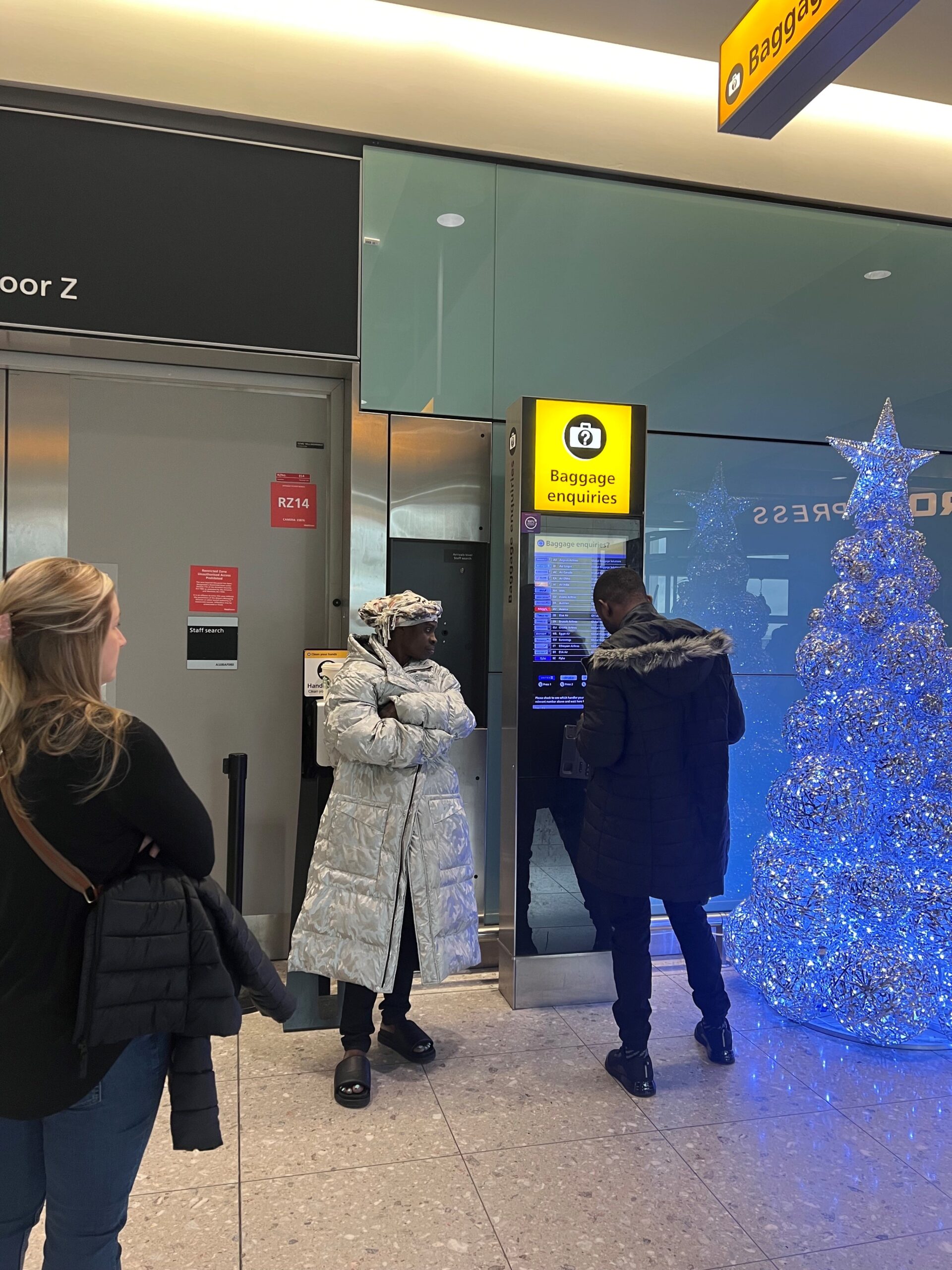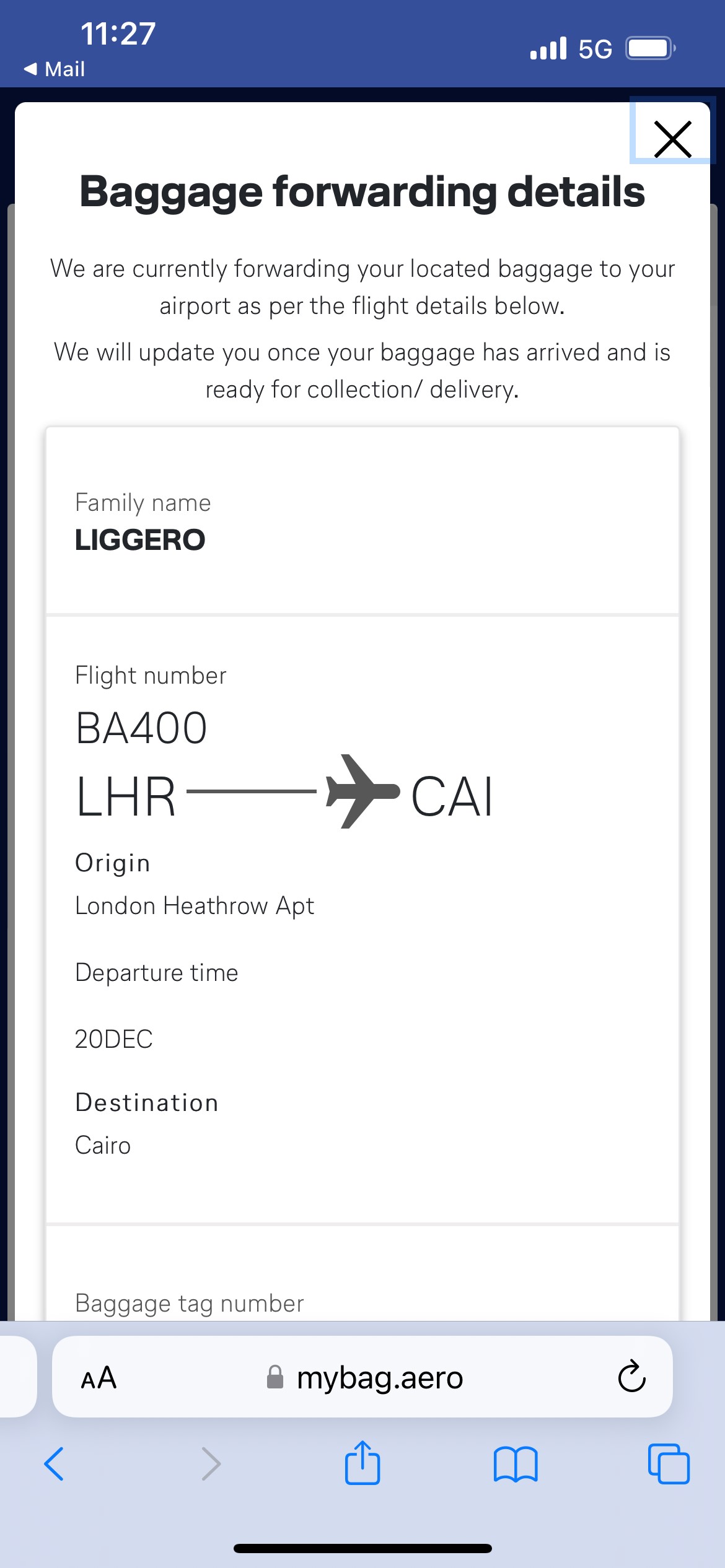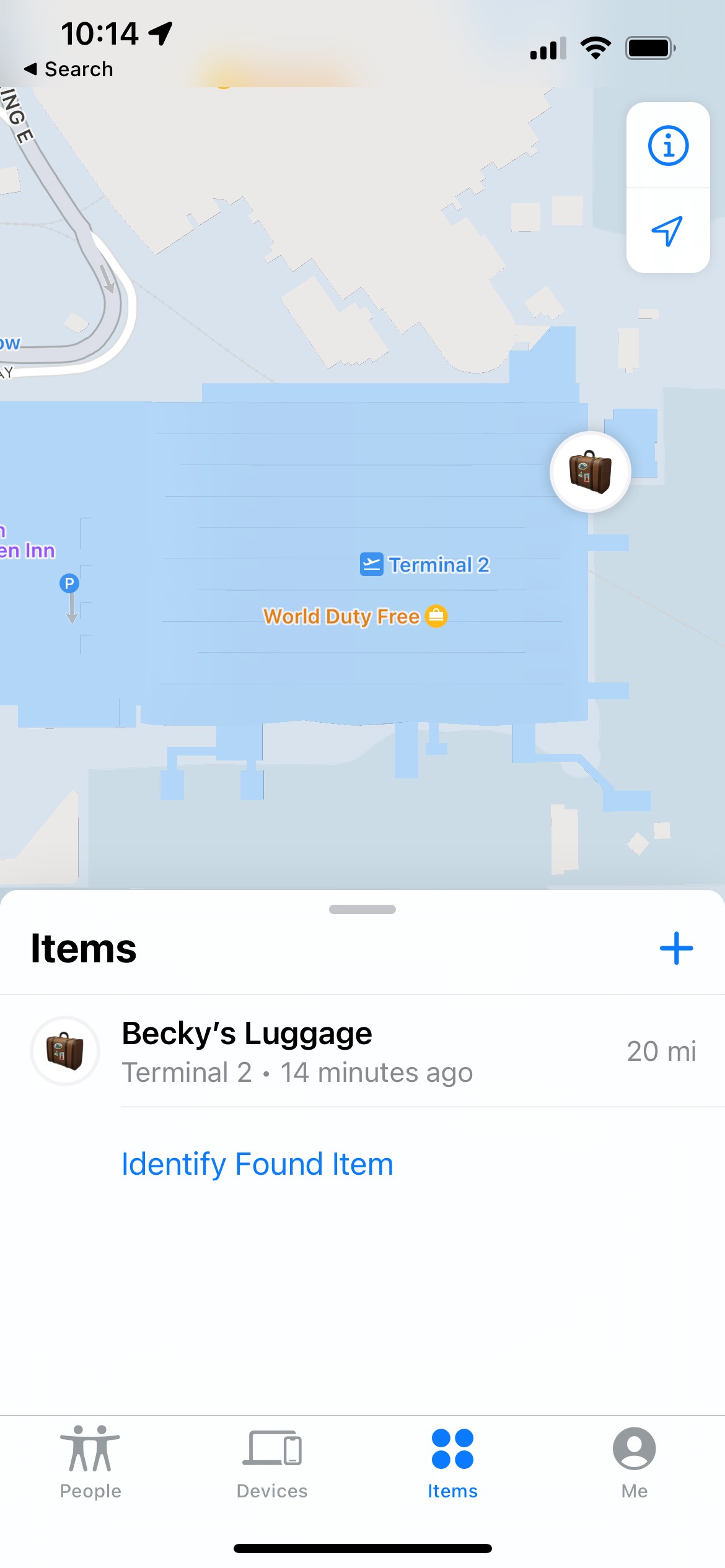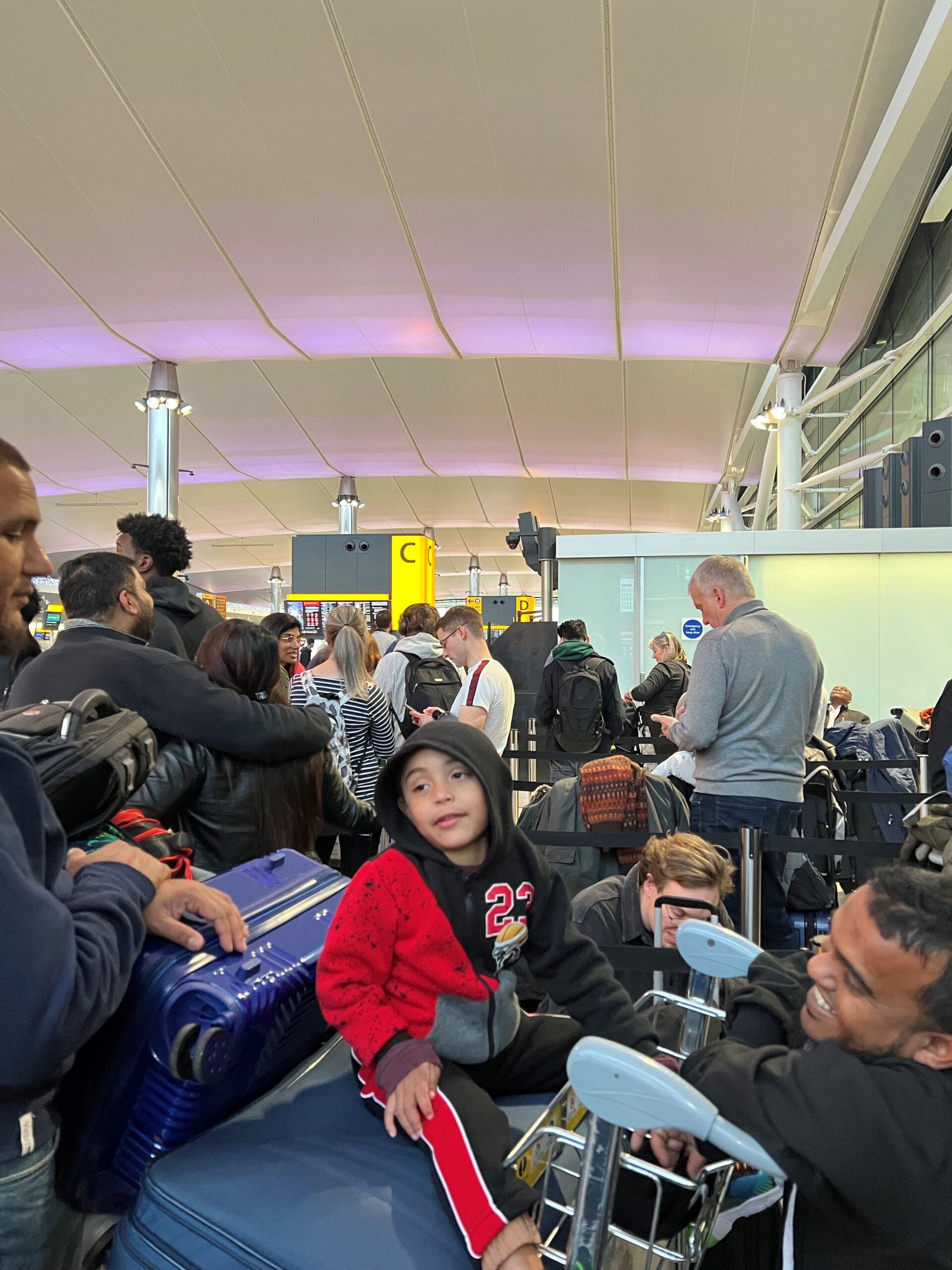
|
Getting your Trinity Audio player ready... |
On December 16, 2022, I was scheduled to fly from London to Cairo via Munich for an IEEE event in Alexandria, but I never got there. My flight from London Heathrow to Munich was canceled last minute by Lufthansa due to bad weather in Germany, and everything went sideways from there.
As anyone who follows me on social media is aware, I was unable to collect my checked bag after my flight was canceled on December 16, and I did not get it back until January 9. Thankfully, I had an Apple Tag inside my bag, so I was able to follow its journey while I went through mine.
Here is the play-by-play of what happened.
- December 16: I checked in at Heathrow T2; the flight was canceled, and Lufthansa did not return checked bags.
- December 17: I returned to T2 and attempted to pick up my bag by calling from the “baggage phone” outside of arrivals, but no one would answer. I went up to departures and stand in line at the Lufthansa ticket desk for NINE HOURS to get my flight rebooked. Lufthansa puts me on British Airways (BA) flights to Cairo via Athens on the next day.

- December 18: I went to Heathrow T5 bright and early to catch BA flights. I got to the gate, flight to Athens was badly delayed. There was no chance of catching the connection to Cairo, BA confirmed my bag was not going to make it on the plane to Athens, and I can see my bag is still in T2 from the Apple Tag. If I miss the flight to Cairo, I cannot make it to the conference in time, so I officially canceled my trip. I went to T2 baggage claim to fight for my bag, but the handlers won’t help me because the bag is one floor below in storage. Later that day, I got an email from Lufthansa saying my bag was going to Cairo on a BA flight the following morning, and I could see my bag moving from T2 to T5 from my Apple Tag. I called BA, and they stopped the bag from flying and told me they would send it to my house.

- December 19: I got a second email from Lufthansa telling me my bag was going to Cairo on a BA flight the following day. I repeat the process again. I call BA, and BA stops the bag from flying, but it remains in T5.
- Dec 19-24: I made numerous phone calls to both BA and Lufthansa baggage lines. BA told me to chase the bag through Lufthansa. Lufthansa told me they have zero information.
- January 2: Apple tag shows bag moving to T1, Heathrow’s abandoned terminal.
- January 4: Apple tag shows bag moving back to T2.
- January 5: After two separate phone calls to Lufthansa Baggage Help Line, I’m assured during both calls if I go to Heathrow with ID, I will be able to pick up my bag using the Apple Tag as a guide. I arrived at T2, and Lufthansa baggage handlers would not help as my bag was one floor below in a storage area, and they didn’t have staff available to help me get it.

- January 5-6: I complain everywhere—online and over the phone—I can think of!
- January 7: I received an email from Lufthansa saying my bag had been handed over to a courier service.
- January 8: Apple tag shows the bag moving from T2 to another location, two miles from Heathrow.
- January 9: The text from the courier finally arrives—my bag is out for delivery. It arrived six hours later.
It took me three weeks and three days to receive a bag that never left Heathrow airport. Why did this happen? It’s a perfect storm. Let’s look at all the parties involved.
Heathrow airport is overwhelmed with holiday travel and has not yet staffed up since COVID-related layoffs. Lufthansa, a German airline, is hit with very bad weather in Germany at the peak of the busy holiday season. British Airways has a “technical glitch” during the peak of the busy holiday season. Global Baggage Solutions, the United Kingdom baggage handling company that Lufthansa and dozens of other airlines outsource, goes on strike. The list of parties involved, and potential failure points just goes on.

So how can updated technology help prevent perfect storms like this from occurring?
Here’s a list of all of the parties potentially involved in delayed or lost baggage:
- the departure and arrival airports
- the airline(s)
- the baggage handlers
- the couriers
- insurance companies
- regulatory bodies such as Civil Aviation Authority
- Apple Tag/tracking device
All of these parties create, share or need passenger data in some way. I spent a lot of my time over the past three-plus weeks correcting one party or another on inaccurate or delayed data that they had regarding my location, flights I did or did not take, and even the whereabouts of my bag in real-time. BA told me my bag was in Cairo at one point, for example, but I knew it was not there because of my Apple Tag data. The tracking interface I had access to from the courier company was poor, it was not in real-time, and the information was bare bones if that. Instead, I watched my Apple Tag data like a hawk until my bag finally arrived.
Imagine if the courier data was as accurate as my Apple Tag data. Imagine if I was proactively notified of my bag’s journey as it moved from one party and location to another. Imagine if each of these parties were held accountable vs. blaming each other for the delay. Imagine if there were incentives for each party to do their job quickly vs. responding only to those who constantly complain as I did.
“There isn’t a strong enough incentive for them to get it right. There’s a general lack of accountability because it’s very difficult to know who’s responsible at each step,” Joe Holles de Peyer, CEO and Co-Founder of Gate2Chain, pointed out to me during a conversation we had regarding my baggage nightmare.
I gave Joe a buzz because I know he and the Gate2Chain team have insight into how blockchain technology can superpower the tourism industry, including baggage at airports.
Joe provided some fascinating intel on how digital twinning and utilizing a single, global ledger to store data can massively upgrade our baggage experience at airports.
“If you had a proper system where digital twins were created for luggage, ideally for each piece of luggage, it’s quick and cheap, and it’s easily done. The piece of luggage would preferably have an RFID chip in it or something, they can either be built into the luggage, or they can have them in little tags that they put on the luggage for you,” he said.
“If the luggage had its RFID chip, if there were sensors at each place—the track it’s on, the conveyor belt, the storage room— and each person who was handling it had an identifier, then you and the different parties involved could know exactly where it is at each moment, and who’s responsible,” he said.
Joe made the point that we are using 20th-century technology to deliver 21st-century expectations when it comes to baggage at airports. The same applies, in fact, to the internet in general, and that’s at the root of so many of society’s problems.
“If they had this single ledger that everyone was sharing and recording the information on so then each step of the process is perfectly recorded, then the responsibility is always clear,” he explained.
In addition to having a single, universal ledger to record and access the baggage data (with permission, of course), Joe said there also needs to be clear incentives tied into it. The key here is combining the information on the single database storage system and attaching value to it with a simple, smart contract where you could include an insurance policy, airline miles, or a flight upgrade that pays out automatically after a certain amount of time has passed.
“Basically, it’s about aligning the different companies—the baggage handling company, the airport, the different companies that are involved in this—to share this common system database on BSV, the only blockchain that scales,” Joe told me.
Everyone wins in a situation like this. Consumers like me are happy because the service is better. All of the companies involved are happy because they have clarity on who is doing it right, where the mistakes are happening, where the blockages are, and where the costs are being incurred.
“It’s having the perfect visibility of every step of the journey. And when you have that, it just changes everything because there’s light, there’s accountability, there’s responsibility,” Joe said.
The good news is experiences like I just had with my bag will be a thing of the past soon. The technology is already here to make the whole baggage process much smoother, and we have amazing minds like Joe and the Gate2Chain team who are working on solutions that will deliver those 21st-century expectations we all have.
Watch: Build on Blockchain: Common Challenges & Tools to Make it Easier
Recommended for you
Lorem ipsum odor amet, consectetuer adipiscing elit. Elit torquent maximus natoque viverra cursus maximus felis. Auctor commodo aliquet himenaeos fermentum
Lorem ipsum odor amet, consectetuer adipiscing elit. Accumsan mi at at semper libero pretium justo. Dictum parturient conubia turpis interdum

 11-21-2024
11-21-2024


